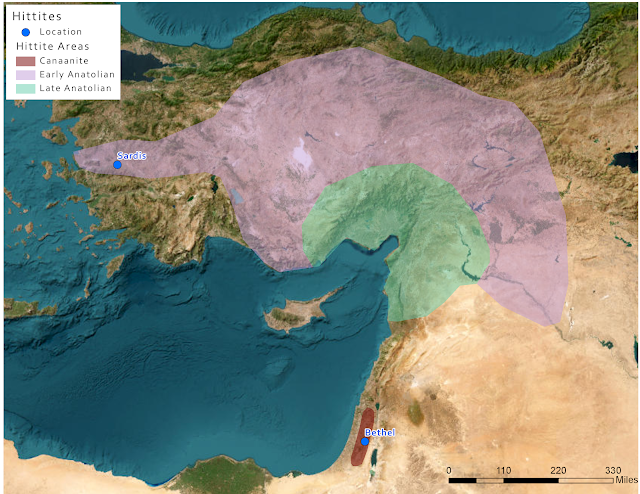Biblical Nations - Hittites
Hittites
Key Scripture: Exodus 3:7-8
Figures: Heth, Ephron, Ahimelech, Uriah
This week we will delve into another one of the people groups who lived in the Promised Land prior to the people of Israel invading under the leadership of Joshua. But this study is more complicated and uncertain that others, because historians, linguists, and archaeologists have long disputed and wrestled with the identity of one or more civilizations that have held the name of "Hittite". Scripture may ultimately reference two separate groups with the same name in the translations we now use, so in this lesson we'll break down the information available and allow the reader to draw conclusions on identity.
The first reference to the Hittites could be written as "Heth-ites", as they are listed in Genesis as the offspring of Heth, the son of Canaan. This family tree is obviously closely related to the other inhabitants of the land that God promised Abraham, and the patriarch himself had dealings with the Hittites. The only land that he ever owned during his years of wandering, despite the covenant he received that assured him that his offspring would possess a vast region, was a field and cave that were purchased as a family gravesite, and that property was purchased from Ephron the Hittite. Several years later his grandson, Esau, married a Hittite woman in an act that caused a great deal of consternation to their mother-in-law, Rebekah. Esau's younger brother Jacob had a dream at the Hittite city of Luz and named the place Bethel, although the city's actual name was not changed for many years until it was finally conquered after the death of Joshua. Although Israel exercised a considerable of military power over the Hittites they were not entirely destroyed as God had commanded, and instead a remnant survived throughout the time of the judges.
The next mention of the Hittites can be found during the time of Israel's early kings, but it is not clear if these people are also descendants of Heth or if these residents of the land known as Hatti (part of Anatolia, which is much of modern-day Turkey) were distinct without any genealogical ties to those living in Canaan. At its height the Hittite Empire stretched all the way to the Aegean Sea to the west, but by the time of Israel's rise they occupied a much smaller region. Before he was king, David was a capable soldier and developed a following of men from multiple nationalities that supported him. Among them were Ahimelech, a soldier not to be confused with a contemporary priest of the same name, and Uriah, who was one of David's mighty men of valor. It was this man who David later had killed in order to marry his wife, Bathsheba, who was already pregnant with David's child. Although that child died her next son was Solomon, who was to succeed his father as king of Israel and eventually build the Temple. It may be noted that Bathsheba was likely not also a Hittite, as her name and her father's (Eliam) are both Hebrew. Throughout Solomon's life he did business with Hittites, such as purchasing horses and chariots, but also married some of their women and built altars to their gods.
After the Israelite kingdom was divided during the reign of Solomon's son, the Hittites are only referenced a few more times. During the time of the prophet Elisha, a Syrian army laid siege to the northern capital of Samaria but were scared away by the sound of troops that God had sent. Their comment that the armies must have been from either the Egyptians or Hittites indicates the size and threat that the Hittites had become. They did not gain favor among the Hebrew people, however, as the prophet Ezekiel disparaged Jerusalem by saying its mother was a Hittite. After the Babylonian captivity ended for Judah, the Hittites were mentioned one final time as one of the nations that the children of Israel were forbidden to marry. The northern Hittite people were eventually conquered by the Assyrian Empire and any surviving remnants living among the Hebrews eventually died off or left the region entirely.



Very interesting and informative!
ReplyDelete